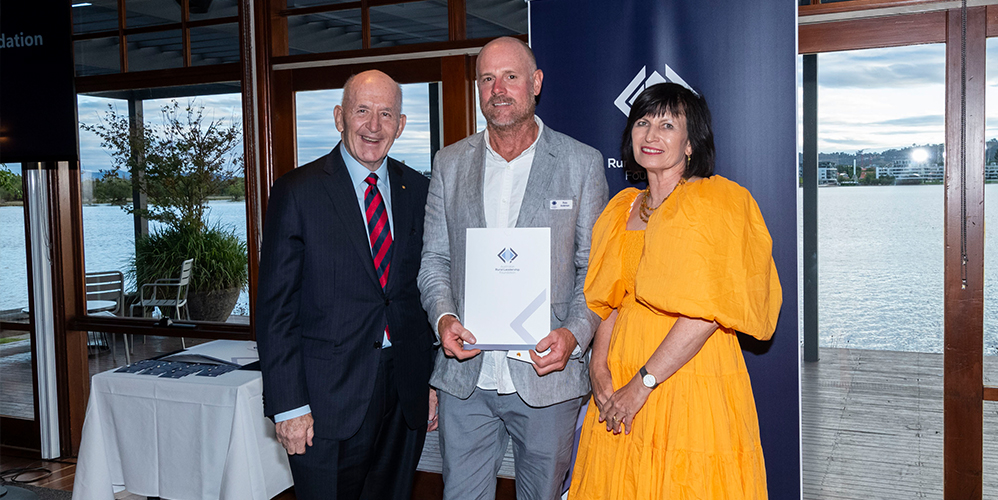“I need to put my own oxygen mask on before I can help anyone else with theirs.”
By Corinna Boldiston
Until recently, fourth-generation dairy farmer Ross Anderson seized opportunities as they arose, rather than seeking them.
As a young adult he grasped the chance to move from the temperate climate of Denison in Gippsland, southern Victoria, to work as a qualified builder – and play footy – on Queensland’s Gold Coast.
The adventure rolled into 10 years away from the Macalister Irrigation District in Victoria, with Ross plying his building trade in London and Perth until 2006.
“I came home when I was 30 to farm with my folks because I was mature enough to give it a go,” he said.
Now aged 45, Ross farms 300ha and milks 500 cows with his parents Graeme and Chris, and partner Jenni. Their rotary dairy has a workforce of seven, with the Andersons in the transition phase of farm succession.
“I love the dairy industry; it’s challenging and rewarding. I love being on the land with animals and producing food,” Ross said.
Since his homecoming in 2006, Ross “didn’t shy away” when industry peers nudged him to apply for leadership roles and development opportunities.
He served five years on the GippsDairy board, and six years (three as chair) on Herd Improvement Co-operative Australia (HICO); and is an alumnus of the 2020-21 Australian Rural Leadership Program (ARLP), sponsored by Gardiner Dairy Foundation.
The 15-month ARLP is a flagship leadership development course, which includes four challenged-based sessions throughout Australia and overseas.
The onset of the COVID-pandemic disrupted parts of the program for Ross’ cohort, with Victorian lockdowns causing some participants to miss the immersive experience in the remote Kimberley region. Ross instead made the most of the alternative online coursework and one-on-one coaching offered to those unable to join the Kimberley session.
Despite the challenges created by COVID, he was grateful for the overall ARLP experience and the valuable addition of ongoing personal mentoring.
“Even though some of our course sessions were via Zoom because of COVID, the ARLP taught me the power of experiential learning; it kept pushing me out of my comfort zone,” he said.
“The program encourages the people on the course to develop each other. I formed some nice bonds at the Canberra session where I also became a member of the course council.”
He gained invaluable insight into contemporary leadership and is more aware of his strengths and weaknesses.
“I think my strengths are I’m authentic and prepared to be vulnerable; I’m not one to shy away from tough situations, and I’m prepared to wear my heart on my sleeve.”
Navigating personal challenges during the timeframe of the course was compounded by COVID restrictions and the two-hour travel distance to see his children (who live with their mother).
“One of my biggest takeaways during the one-on-one coaching sessions during the ARLP was understanding that I need to put my own oxygen mask on before I can help anyone else with theirs.
“I had been spreading myself too thin and not hitting the mark anywhere, so I stepped aside from GippsDairy and HICO to focus on my wellbeing and my relationship with my children.
“I now have a plan and a commitment to myself and my family to look after myself so that I can help look after them.”
Ross said role-modelling the importance of wellbeing was one of the numerous lessons from ARLP that had transformed his style of leadership.
“This program has given me the strength to take action and determine my own outcomes: wellbeing is now an absolute priority in my life,” he said.
“It’s important that leaders ‘do’ as well as ‘lead’; you don’t just lead with words, you lead by example ̶ your actions ̶ as well.”
On the farm, and with his family, Ross has developed his leadership style to empower others through effective communication and positive role-modelling.
“Leadership is really a lot like dairy farming; you have responsibilities and you need to adapt and understand different situations and circumstances,” he said.
“You can’t farm – or be a leader – on your own; you need to have good people around you who can also adapt to different situations.
“I empower others by listening, making sure they understand what’s being communicated, and giving them responsibility.
“I teach the people around me that their voices are important and valued.”
Ross encouraged everyone in the dairy industry to lead by example and step out of their comfort zone.
“Leadership is not about a title; it’s about being collaborative and transparent, and individuals working as a team,” he said.
“There are so many opportunities for people to play their role as leaders within the agricultural community and working together to spread that investment.”

